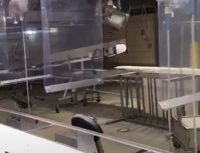
Tyson’s Waterloo production facility
DES MOINES, Iowa - Top executives and supervisors at Tyson Foods may be liable for the deaths of four workers after keeping a meatpacking plant open long after COVID-19 was racing through the factory, the Iowa Supreme Court ruled.
While state law protects businesses against most COVID claims, it contains an exception for reckless behavior, the court said. The plaintiffs presented sufficient evidence that Tyson executives ignored exponentially rising COVID cases at the Waterloo plant as well as pleas by local health officials to shut it down, until after several workers died, the court said.
That evidence includes claims Tyson emailed workers to keep coming to work despite what it referred to as “stories about ‘shelter in place.’” The plaintiffs also said workers were told they couldn’t go home unless they produced a positive COVID test even though Tyson’s seasonal flu policy was to allow symptomatic workers to stay home.
The lawsuit by the workers’ estates alleges sufficient facts to meet the “exception that the executive and supervisor defendants `recklessly disregarded a substantial and unnecessary risk that the individual would be exposed to COVID-19,’” said the court, in a May 23 decision by Justice Matthew McDermott.
Soon after the COVID-19 virus emerged in China, Tyson’s Chinese operation provided masks and personal protective equipment to employees, checked workers’ temperatures twice a day, installed air filtration systems and prohibited symptomatic employees from going to work.
Tyson delayed implementing similar measures at its Waterloo plant, Tyson’s largest pork processing facility with almost 3,000 workers. One worker who vomited on the production line was allowed to continue to work, the lawsuit states.
A supervisor is accused of stopping a worker who wanted to leave to get tested, saying: “We all have symptoms — you have a job to do.” A supervisor allegedly referred to COVID-19 as “glorified flu” and said “everyone is going to get it.”
Workers calling in sick in 2020 increased from 94 on April 1 to 656 on April 20, but the plant remained open even as Tyson closed its Columbus Junction processing plant. Local health officials urged Tyson to close the plant but the company refused until almost two dozen workers wound up in the emergency room and five died.
A trial court dismissed the case, saying it belonged in the workers’ compensation system. But the Iowa Supreme reversed, ruling the workers’ comp law doesn’t cover intentional behavior. The court ruled the case to proceed against Tyson Chairman John Tyson, CEO Noel White and several other executives and plant supervisors.


